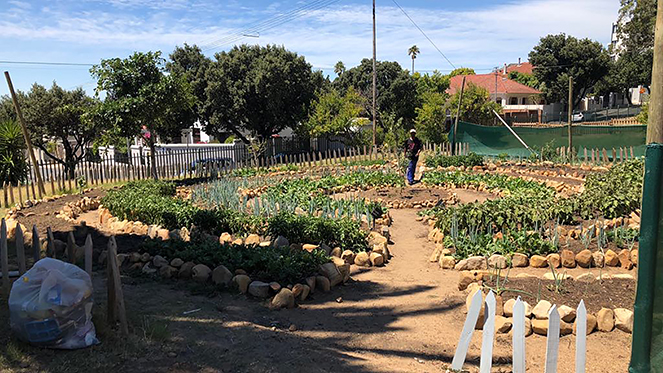Clean water and sanitation still just a dream for millions of people

Biolan, a Finnish company specialised in ecological gardening and environmental products, has donated two dry toilets to South Africa. The donation took place via a voluntary work project of the Remote Year work and travel abroad programme. The groundwork for collaboration on dry toilets between Finland and South Africa was laid in September 2019 when a delegation from Finland met the South-African Deputy Minister of Water and Sanitation.
The goods were dispatched from the Biolan plant at the turn of the year, heading towards Cape Town in South Africa. The destinations for the two dry toilets were two Streetscape Gardens in Vredehoek and Trafalgar High School, both with deficient sanitation conditions. Before that there were no functioning sanitation facilities on the premises. The only option to provide the operators and visitors of these sites with hygienic sanitation facilities was a toilet that works without water and electricity.
Streetscape Garden is a project launched by a South-African non-profit organisation Khulisa Social Solutions in 2015 to promote safer, healthier and more prosperous urban communities. The aim of the project is to help the homeless or people in a vicious circle of petty crime or drugs to find jobs and adapt to society. The project offers them work e.g. in gardening.
“Streetscape Garden has been a path-breaking project in many ways, in terms of both the people and the environment. It is a new method to help people find their way back to society. The donation from Biolan helps to solve societal problems, as well as saving water”, says Katri Mehtonen from the Finnish Water Forum, who was a member of the delegation that promoted Finnish water and sanitation expertise in Cape Town.
Cape Town and South Africa as a whole are struggling with a serious water shortage, and already last year a “Day 0” was set for Cape Town when all taps would have been shut. Rains that came in the very last minute prevented the worst from happening, but the situation is still fragile, both in Cape Town and in the whole country.
Sustainable sanitation through development cooperation
In many developing and emerging countries, urbanisation that builds on the present water infrastructure rests on an ecologically unsustainable basis. Cape Town has managed to reduce water consumption by an estimated 60 per cent, but the situation remains critical. One of the main causes is increased drought: in recent years rainfall in the area has been the lowest ever.
Strict regulation of water consumption has worked in Cape Town, but political will and financing are needed to find a permanent solution to the water crisis. Water use efficiency and the recycling of water must be increased, and this requires the introduction of advanced technologies. Instead of the so-called linear water management systems where drinking water is made from raw water, i.e. the water is used, purified and discharged back to water bodies or the sea, there is a need for water management that makes use of the circular economy. This means that water and wastewater are considered as raw material and the energy, nutrients and other materials contained in them, including valuable metals, are utilised for other business operations.
“Biolan has a long history of business operations in ecological sanitation, and we have designed dry toilets that work without water and electricity. We believe that promoting a culture of dry toilets in emerging countries offers a sustainable way to develop sanitation and hygiene. There is no sense in wasting water to flush away toilet waste – especially where drought is a serious problem” says Iikka Helin, Sales and Marketing Director at Biolan.
Competitive solutions from Finland
The UN estimates that as many as two billion people still live without any kind of sanitation and every year more than two million people, most of them under five-year-old children, die of diseases caused by dirty water and poor sanitation. There is a need for planning and introduction of water management and sanitation that make use of dry sanitation systems especially in peripheral and rural regions, sometimes to complement the already existing sewerage and wastewater purification solutions.
“What Finland has to offer is competitive solutions to global water and sanitation challenges and for target-oriented collaboration between the private and public sector. Our strong water expertise is linked to innovative IT expertise, reliable technologies and environmentally-friendly production processes. Companies offer solutions to comprehensive management of water and its use, including modern dry toilet systems”, says Jaana Husu-Kallio, Permanent Secretary at the Ministry of Agriculture and Forestry.
During her visit to South Africa last autumn she met the South-African Deputy Minister of Water and Sanitation Pamela Tshwete. The purpose of the visit was to promote the export of Finnish water expertise and food to South Africa. Among the issues that were high on the agenda were Finnish expertise in water and sanitation issues and the need for dry toilets. Also included in the delegation was a number of Finnish water sector companies and export authorities.
Inquiries:
Olli-Matti Verta, Ministerial Adviser, +358 295 162 123, firstname.lastname@mmm.fi



